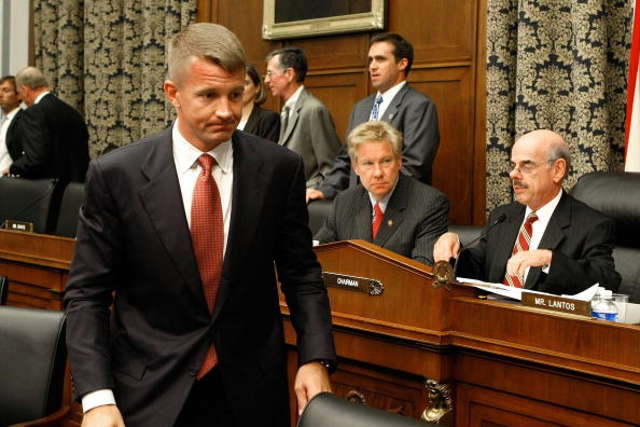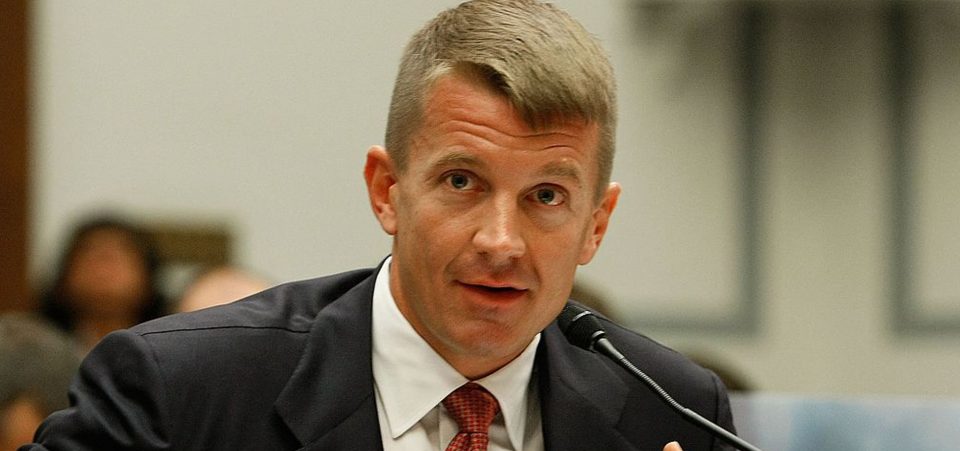Who Is Erik Prince?
You may have heard of Blackwater USA. No, as tempting as it might be, it isn’t a shoddy swimming pool service company. As it turns out, Blackwater is a little private army. It is a military security contractor that came to prominence shortly after the U.S. invasion of Iraq in 2003. It is notorious for having been implicated in several shady and bloody episodes. It’s also famous for Erik Prince. Who is Erik Prince?
Erik Prince is a former U.S. Navy Seal. He founded his private military contracting firm in the mid-1990s after reportedly feeling disappointed in the West’s failure to intervene in the Rwandan Genocide of 1994. (Source: “Protests outside, cheers inside as Blackwater founder Erik Prince speaks in Holland,” MLive, May 5, 2010.)
The 48-year-old Prince has attracted considerable attention and not just from military aficionados. Many have wondered “Who is Erik Prince married to?” Indeed, many of Erik Prince’s personal details are public, far too many for someone who is involved what you would expect to be a secretive business.
For the record, as any Erik Prince wiki worth its name should note, if you look up “Erik Prince wife,” the search will reveal at least two names: Joan Nicole Prince and Joanna Ruth Prince. Joan Nicole, Erik Prince’s first wife (and the mother of his first four children), died in 2003. He remarried Joanna Ruth a year later and they have three children together. They divorced in 2012. Prince’s latest wife is Stacy DeLuke. (Source: “Notorious Mercenary Erik Prince Is Advising Trump From the Shadows,” The Intercept, January 17, 2017.)
In this article, we will see everything about Erik Princes’ family, political career & other details.
#1. Erik Prince’s Interesting Family of Billionaires
Doubtless, Erik Prince has an interesting family. His father, Edgar D. Prince, founded what would become a billion-dollar company in the automotive business in the 1960s. But you might be surprised to find out that one of Erik Prince’s siblings currently holds an important position in President Donald trump’s cabinet. She is Betsy DeVos, a billionaire herself. Indeed, Trump appointed Erik Prince’s sister, Betsy DeVos, as the United States Secretary of Education.

Betsy DeVos, Erik Princes’ sister and Secretary of Education (Credits: Mark Wilson/Staf/ Getty Images)
Still, Betsy DeVos—famous for her support of charter schools—notwithstanding, it’s the Erik Prince Blackwater connection that most want to know about. After all, like him or not, there’s no denying that Erik Prince has had an interesting life. Anyone wondering what Erik Prince is doing now won’t be disappointed. Prince is a king of adventure.
Also Read:
Andrew Wheeler Wiki: Everything You Need to Know About the Coal Lobbyist
Rex Tillerson’s Net Worth – $180M Added to His Wealth in 2017
Recently, Prince has been busy in China and he could have another role to play in Afghanistan. Prince has left Blackwater to manage Frontier Services Group Ltd (HKG:0500), a Hong Kong-based agency. If it sounds boring, it isn’t. Frontier helps companies with significant overseas operations deal with “operational challenges” from the point of view of security and logistics. In other words, Erik Prince has exchanged Blackwater for something that’s not much different. It may involve fewer assault rifles and camouflage, but the overall scope of his business has remained the same.
#2. Erik Prince Lives in the Shadows
Naturally, the answer to the question “Where does Erik Prince live?” is not going to disappoint vicarious adventure seekers. More than Lawrence of Arabia, who was something of an idealist, an academic, and a philosopher, Prince is like a character from a Rudyard Kipling novel at best or the Expendables movie franchise at worst. He has lived in Abu Dhabi since 2010. He has also been living in Hong Kong, given his new Frontier Services is based there. (Source: “Blackwater Founder Moves to Abu Dhabi, Records Say,” The New York Times, August 17, 2010.)
But, some might answer the question by simply noting that he lives in the shadows. One of those shadows may, or may not, speak Russian. There have been rumors of links tying together Erik Prince, Trump, Russia…and Vladimir Putin, of course. (Source: “4 Insights About Blackwater Founder Erik Prince,” NPR, August 31, 2017.)

Credit: Mark Wilson/ Staff/Getty Image
Prince’s name turned up in a story by The Washington Post about an alleged meeting between Prince and a Russian fellow with inevitable links to Russian President Vladimir Putin. The meeting took place in the Seychelles, days before Trump’s inauguration (January 20). (Source: “Blackwater founder held secret Seychelles meeting to establish Trump-Putin back channel,” The Washington Post, April 3, 2017.)
The purpose of the meeting, suggests The Washington Post, was ostensibly to persuade Putin to distance himself from Iran. Indeed, as anyone who has followed the war in Syria knows, Russia has been cooperating with Iran to help break the Islamist militias (including Islamic State/ISIS and Al-Qaeda).
#3. Erik Prince, Mercenaries, and Trump’s Afghanistan Strategy
It’s unclear what, if any, connection—other than through Betsy DeVos—Erik Prince may have had to Trump. But some of Trump’s recent foreign policy and defense directions offer some valuable hints. One of the most revealing factors is Afghanistan.
The Trump White House has not hidden its intention to remain in Afghanistan. In fact, Trump has hinted that he wants a bigger deployment of forces. Erik Prince and Blackwater and help the president achieve some of these goals without getting the U.S. Army involved. But Prince is free to contract his services to others.
Security companies like Blackwater have become especially drawn to the Chinese market. China and Russia want to revive the Silk Road. Blackwater and the like can offer the kind of protection that pipelines, roads, or railways in such unstable areas as Pakistan or Afghanistan require.
Credits: Alan Covey/ Flickr.com
There are reasons the U.S. wants to stay in Afghanistan. For starters, the mining industry could be quite profitable in the Asian country. Mining entrepreneurs say that there are important resources to develop starting from copper. That said, part of the Trump strategy to bring Afghanistan in line may be to use alternatives to the U.S. armed forces. Rather than risk public relations disasters involving the highly visible armed forces, people like Prince can arrange for a war to be “contracted out.” Just like his counterparts from Hollywood and late 19th-century British pro-colonialist literature, Prince can address specific targets—including those that can quickly be turned around into profitable ventures (like mining operations).
For all we know, those companies may have ties to the president or some of his people. The point is that Prince, given his experience at Blackwater, understands the role that private armies or mercenaries can play. Of course, for Prince, it’s best to stay outside the United States. That way, he can also help a number of foreign governments, supplying special operations to help resolve some of their issues—so long as they don’t interfere with U.S. interests.
Indeed, such are the ambitions that the Erik Prince issue has not gone unnoticed from the real soldiers in Trump’s White House. The idea of mercenaries essentially running the show in Afghanistan has not pleased—according to reports—Defense Secretary James Mattis and Security Adviser Herbert McMaster. (Source: “Erik Prince’s Plan to Privatize the War in Afghanistan,” The Atlantic, August 18, 2017.)
These two generals represent the Pentagon. And the Pentagon, evidently, does not want to play second fiddle to Erik Prince when it comes to important strategy masterplans. The Taliban have reacted predictably to Trump’s threats. They said they would continue to launch attacks throughout the provinces.
One of the main characteristics of these attacks is the use of car bomb and/or suicide bombers in crowded urban centers. The Afghan Army, despite NATO’s now 16 years of presence, money, equipment, and personal commitment in Afghanistan, has not become self-sufficient as it were.
If Trump sends more tanks and more planes, it won’t change the situation. The Americans and NATO will continue to win the battles. But the Taliban understand—as did the Vietnamese and all asymmetric warriors—that they don’t have to win the battles. They merely have to endure to win, because the NATO forces will eventually leave. The Taliban are fighting to stay; they’re going nowhere.
Perhaps sending more troops is the only tactical move that could help break the impasse in Afghanistan. But that’s not politically expedient. Drones are popular because they help reduce NATO casualties. Enter Prince and his private armies. As private forces, not representing an international coalition or national government, they can operate with fewer restrictions. For starters, the mercenary army would be answerable only to Prince—and therefore only to Trump, should he be involved.
As for Blackwater, Prince’s first company received over $1.0 billion in unspecified federal contracts and missions. Blackwater, it should be specified, is not the only private “security” company, nor is it the first. But it may be the largest. It’s also the one with the most frontline visibility, given that Blackwater has supplied guards for U.S. embassies and military bases abroad. And it’s not just George W. Bush or Donald Trump who has subcontracted security and military ops to Blackwater. The Obama administration awarded it some multi-million contracts for CIA and State Department operations among others. (Source: “Blackwater’s New Sugar Daddy: The Obama Administration, Blackwater’s New Sugar Daddy: The Obama Administration,” June 28, 2010.)
Some say that Erik Prince believes the difference between a Blackwater army and the U.S. armed forces is like the one between FedEx Corporation (NYSE:FDX) and the U.S. Post Office. Blackwater presents itself as an efficient and private solution, which contrasts with the inefficient government military, bogged down by a costly bureaucracy. (Source: “America’s private sector army,” The Week, February 7, 2014.)






